A Reflection on Psychological Wellbeing: Personal Growth and Theories
VerifiedAdded on 2022/11/26
|6
|1362
|461
Essay
AI Summary
This essay provides a reflective analysis of the student's personal journey and transformation in psychological wellbeing. It begins by defining psychological wellbeing and its connection to subjective happiness and satisfaction, and then describes the student's evolving perspective. The student shares how the module on wellbeing influenced their life, particularly in areas such as self-acceptance, building positive relationships, and fostering personal growth. The essay contrasts the student's past experiences with the positive changes brought about by the module's teachings. Furthermore, the essay discusses hedonic and eudaimonic theories of psychological wellbeing, emphasizing their roles in the student's understanding of mental wellbeing, and how daily experiences can sustain or diminish it, including the impact of stress. References supporting the theories and concepts discussed are also provided.
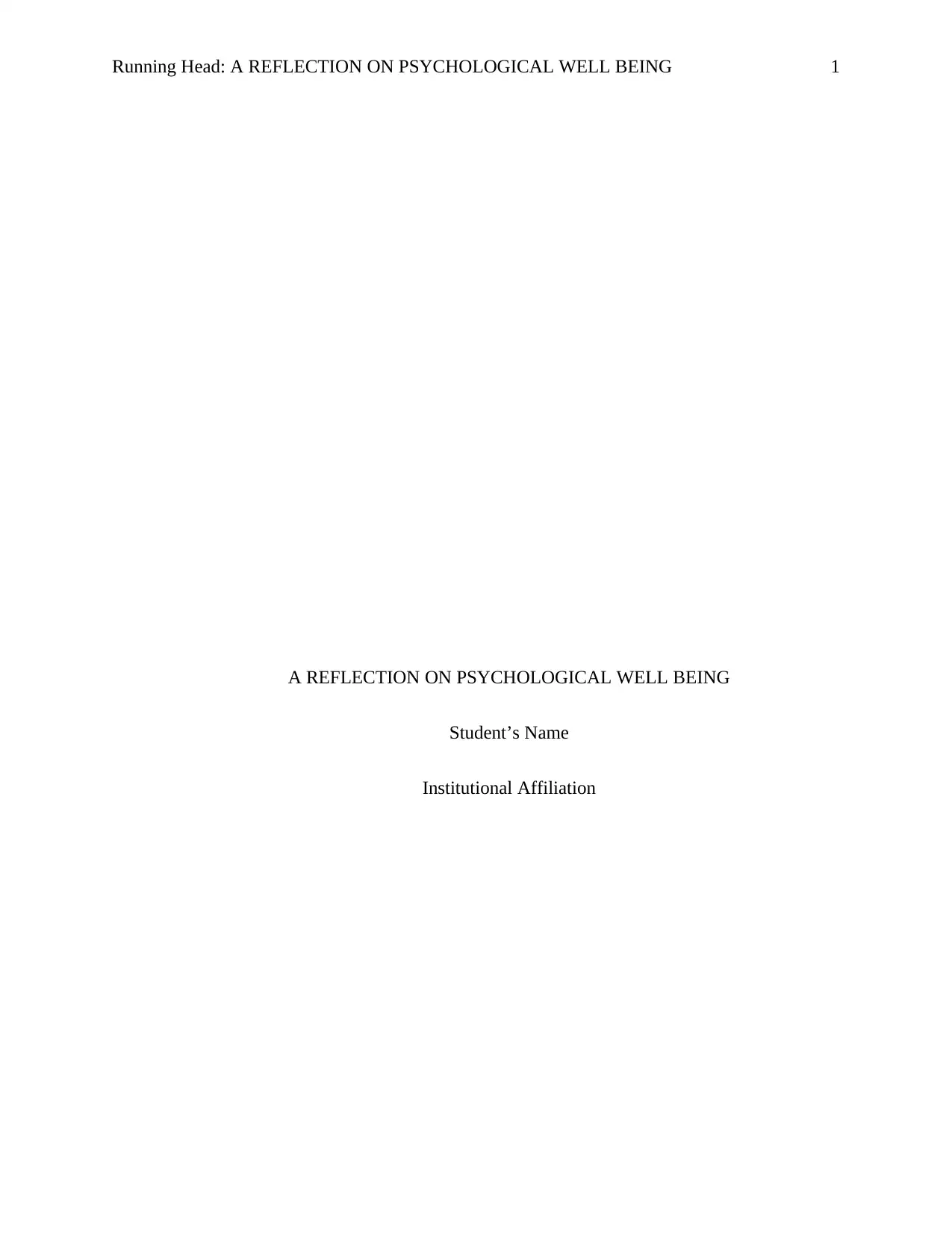
Running Head: A REFLECTION ON PSYCHOLOGICAL WELL BEING 1
A REFLECTION ON PSYCHOLOGICAL WELL BEING
Student’s Name
Institutional Affiliation
A REFLECTION ON PSYCHOLOGICAL WELL BEING
Student’s Name
Institutional Affiliation
Paraphrase This Document
Need a fresh take? Get an instant paraphrase of this document with our AI Paraphraser
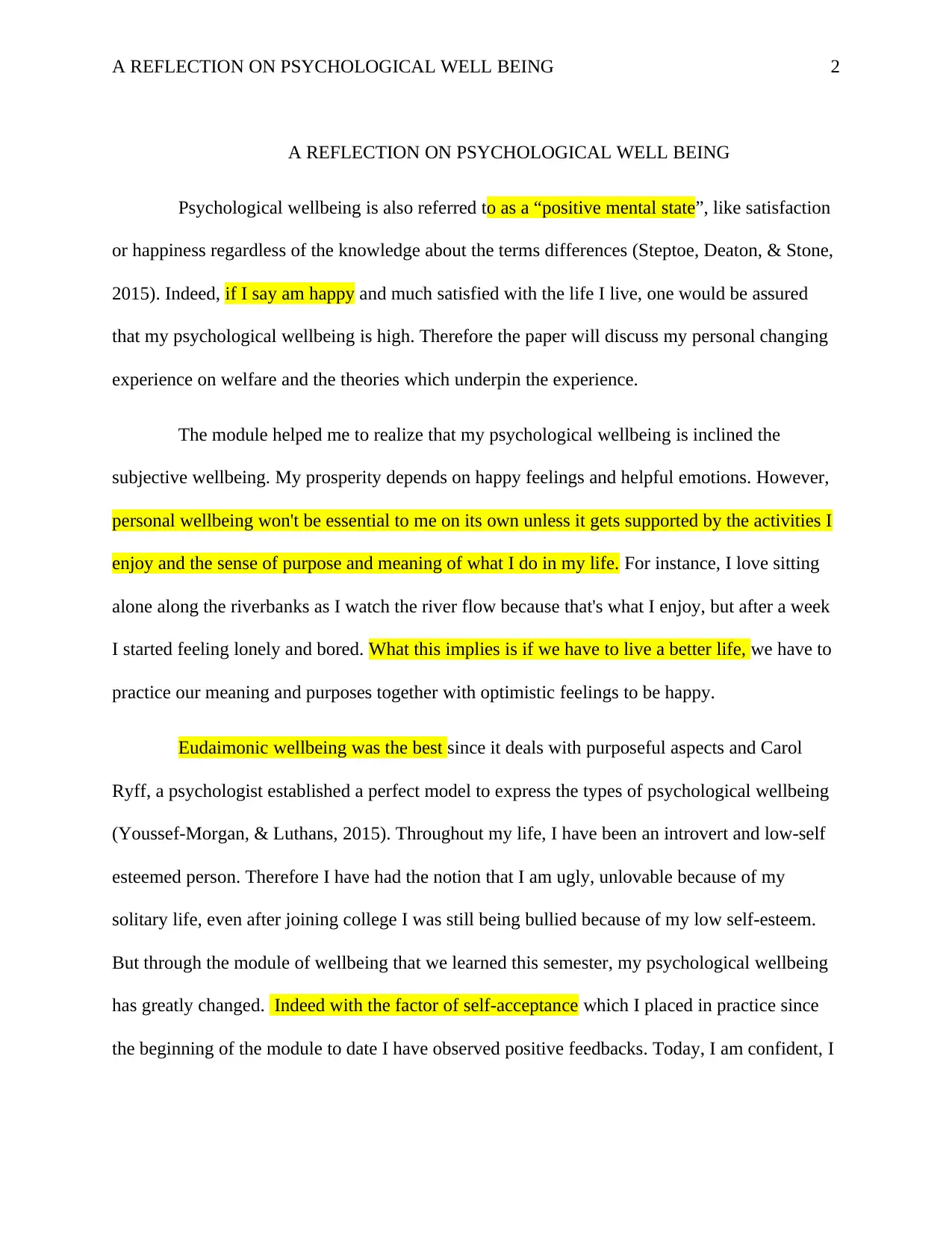
A REFLECTION ON PSYCHOLOGICAL WELL BEING 2
A REFLECTION ON PSYCHOLOGICAL WELL BEING
Psychological wellbeing is also referred to as a “positive mental state”, like satisfaction
or happiness regardless of the knowledge about the terms differences (Steptoe, Deaton, & Stone,
2015). Indeed, if I say am happy and much satisfied with the life I live, one would be assured
that my psychological wellbeing is high. Therefore the paper will discuss my personal changing
experience on welfare and the theories which underpin the experience.
The module helped me to realize that my psychological wellbeing is inclined the
subjective wellbeing. My prosperity depends on happy feelings and helpful emotions. However,
personal wellbeing won't be essential to me on its own unless it gets supported by the activities I
enjoy and the sense of purpose and meaning of what I do in my life. For instance, I love sitting
alone along the riverbanks as I watch the river flow because that's what I enjoy, but after a week
I started feeling lonely and bored. What this implies is if we have to live a better life, we have to
practice our meaning and purposes together with optimistic feelings to be happy.
Eudaimonic wellbeing was the best since it deals with purposeful aspects and Carol
Ryff, a psychologist established a perfect model to express the types of psychological wellbeing
(Youssef‐Morgan, & Luthans, 2015). Throughout my life, I have been an introvert and low-self
esteemed person. Therefore I have had the notion that I am ugly, unlovable because of my
solitary life, even after joining college I was still being bullied because of my low self-esteem.
But through the module of wellbeing that we learned this semester, my psychological wellbeing
has greatly changed. Indeed with the factor of self-acceptance which I placed in practice since
the beginning of the module to date I have observed positive feedbacks. Today, I am confident, I
A REFLECTION ON PSYCHOLOGICAL WELL BEING
Psychological wellbeing is also referred to as a “positive mental state”, like satisfaction
or happiness regardless of the knowledge about the terms differences (Steptoe, Deaton, & Stone,
2015). Indeed, if I say am happy and much satisfied with the life I live, one would be assured
that my psychological wellbeing is high. Therefore the paper will discuss my personal changing
experience on welfare and the theories which underpin the experience.
The module helped me to realize that my psychological wellbeing is inclined the
subjective wellbeing. My prosperity depends on happy feelings and helpful emotions. However,
personal wellbeing won't be essential to me on its own unless it gets supported by the activities I
enjoy and the sense of purpose and meaning of what I do in my life. For instance, I love sitting
alone along the riverbanks as I watch the river flow because that's what I enjoy, but after a week
I started feeling lonely and bored. What this implies is if we have to live a better life, we have to
practice our meaning and purposes together with optimistic feelings to be happy.
Eudaimonic wellbeing was the best since it deals with purposeful aspects and Carol
Ryff, a psychologist established a perfect model to express the types of psychological wellbeing
(Youssef‐Morgan, & Luthans, 2015). Throughout my life, I have been an introvert and low-self
esteemed person. Therefore I have had the notion that I am ugly, unlovable because of my
solitary life, even after joining college I was still being bullied because of my low self-esteem.
But through the module of wellbeing that we learned this semester, my psychological wellbeing
has greatly changed. Indeed with the factor of self-acceptance which I placed in practice since
the beginning of the module to date I have observed positive feedbacks. Today, I am confident, I
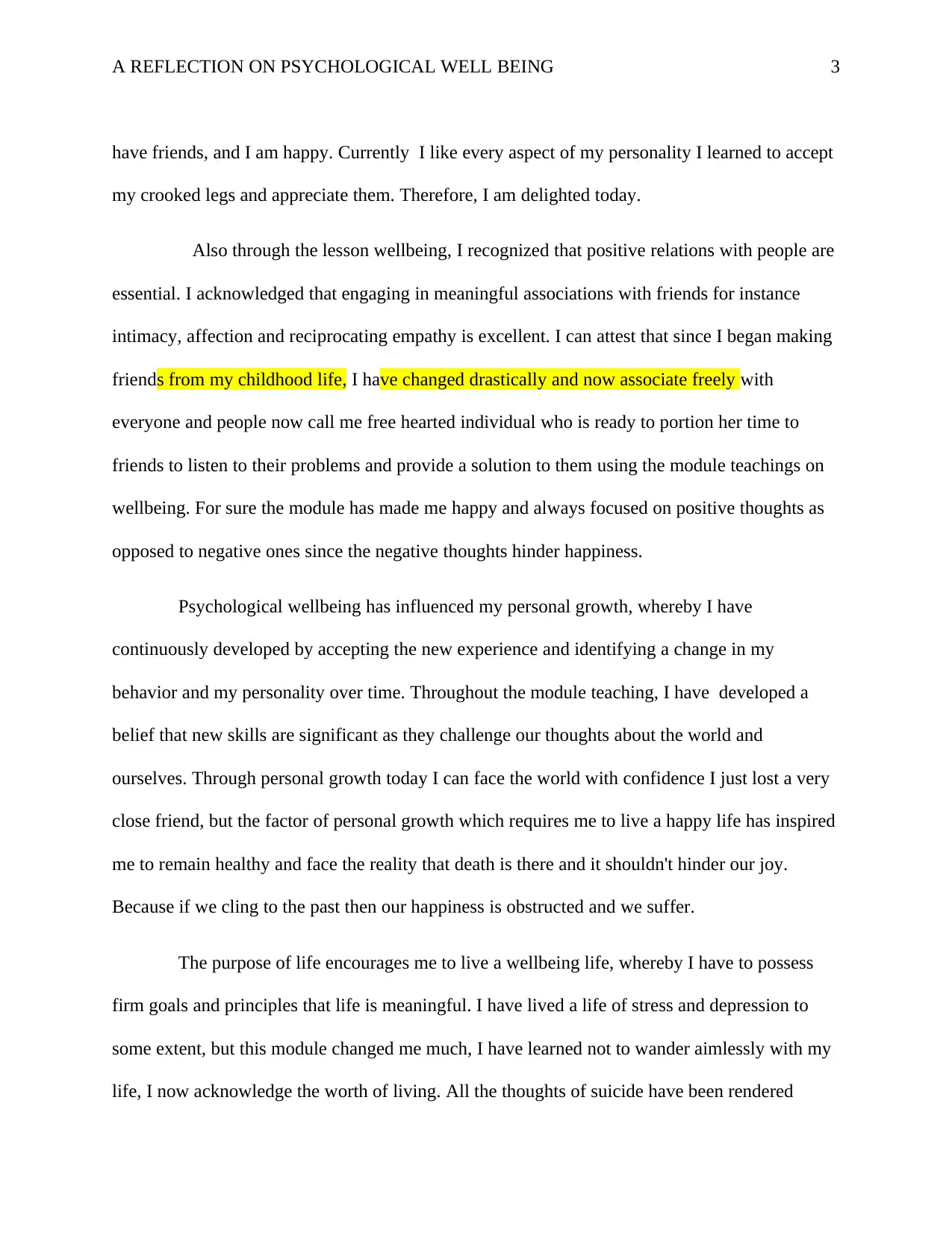
A REFLECTION ON PSYCHOLOGICAL WELL BEING 3
have friends, and I am happy. Currently I like every aspect of my personality I learned to accept
my crooked legs and appreciate them. Therefore, I am delighted today.
Also through the lesson wellbeing, I recognized that positive relations with people are
essential. I acknowledged that engaging in meaningful associations with friends for instance
intimacy, affection and reciprocating empathy is excellent. I can attest that since I began making
friends from my childhood life, I have changed drastically and now associate freely with
everyone and people now call me free hearted individual who is ready to portion her time to
friends to listen to their problems and provide a solution to them using the module teachings on
wellbeing. For sure the module has made me happy and always focused on positive thoughts as
opposed to negative ones since the negative thoughts hinder happiness.
Psychological wellbeing has influenced my personal growth, whereby I have
continuously developed by accepting the new experience and identifying a change in my
behavior and my personality over time. Throughout the module teaching, I have developed a
belief that new skills are significant as they challenge our thoughts about the world and
ourselves. Through personal growth today I can face the world with confidence I just lost a very
close friend, but the factor of personal growth which requires me to live a happy life has inspired
me to remain healthy and face the reality that death is there and it shouldn't hinder our joy.
Because if we cling to the past then our happiness is obstructed and we suffer.
The purpose of life encourages me to live a wellbeing life, whereby I have to possess
firm goals and principles that life is meaningful. I have lived a life of stress and depression to
some extent, but this module changed me much, I have learned not to wander aimlessly with my
life, I now acknowledge the worth of living. All the thoughts of suicide have been rendered
have friends, and I am happy. Currently I like every aspect of my personality I learned to accept
my crooked legs and appreciate them. Therefore, I am delighted today.
Also through the lesson wellbeing, I recognized that positive relations with people are
essential. I acknowledged that engaging in meaningful associations with friends for instance
intimacy, affection and reciprocating empathy is excellent. I can attest that since I began making
friends from my childhood life, I have changed drastically and now associate freely with
everyone and people now call me free hearted individual who is ready to portion her time to
friends to listen to their problems and provide a solution to them using the module teachings on
wellbeing. For sure the module has made me happy and always focused on positive thoughts as
opposed to negative ones since the negative thoughts hinder happiness.
Psychological wellbeing has influenced my personal growth, whereby I have
continuously developed by accepting the new experience and identifying a change in my
behavior and my personality over time. Throughout the module teaching, I have developed a
belief that new skills are significant as they challenge our thoughts about the world and
ourselves. Through personal growth today I can face the world with confidence I just lost a very
close friend, but the factor of personal growth which requires me to live a happy life has inspired
me to remain healthy and face the reality that death is there and it shouldn't hinder our joy.
Because if we cling to the past then our happiness is obstructed and we suffer.
The purpose of life encourages me to live a wellbeing life, whereby I have to possess
firm goals and principles that life is meaningful. I have lived a life of stress and depression to
some extent, but this module changed me much, I have learned not to wander aimlessly with my
life, I now acknowledge the worth of living. All the thoughts of suicide have been rendered
⊘ This is a preview!⊘
Do you want full access?
Subscribe today to unlock all pages.

Trusted by 1+ million students worldwide
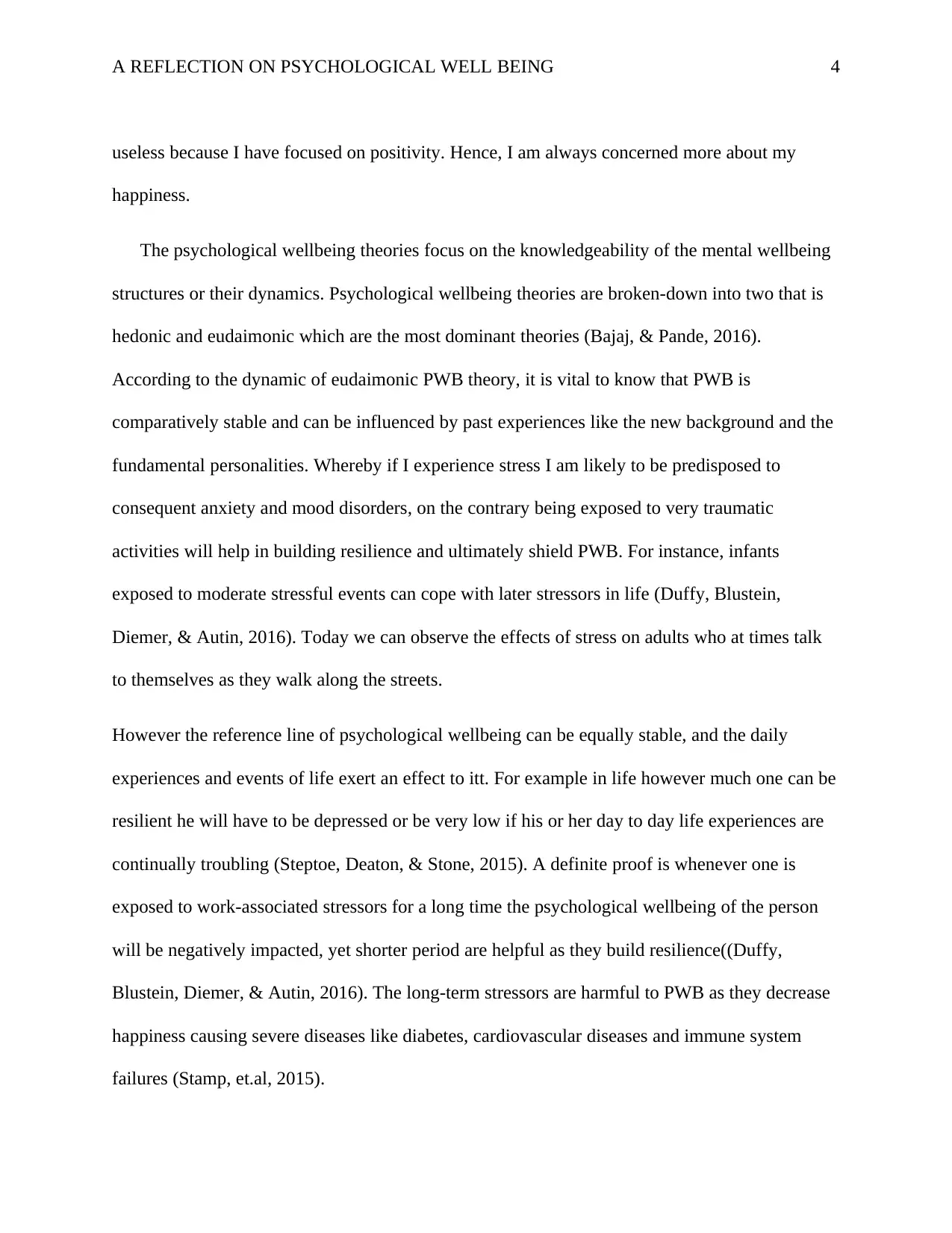
A REFLECTION ON PSYCHOLOGICAL WELL BEING 4
useless because I have focused on positivity. Hence, I am always concerned more about my
happiness.
The psychological wellbeing theories focus on the knowledgeability of the mental wellbeing
structures or their dynamics. Psychological wellbeing theories are broken-down into two that is
hedonic and eudaimonic which are the most dominant theories (Bajaj, & Pande, 2016).
According to the dynamic of eudaimonic PWB theory, it is vital to know that PWB is
comparatively stable and can be influenced by past experiences like the new background and the
fundamental personalities. Whereby if I experience stress I am likely to be predisposed to
consequent anxiety and mood disorders, on the contrary being exposed to very traumatic
activities will help in building resilience and ultimately shield PWB. For instance, infants
exposed to moderate stressful events can cope with later stressors in life (Duffy, Blustein,
Diemer, & Autin, 2016). Today we can observe the effects of stress on adults who at times talk
to themselves as they walk along the streets.
However the reference line of psychological wellbeing can be equally stable, and the daily
experiences and events of life exert an effect to itt. For example in life however much one can be
resilient he will have to be depressed or be very low if his or her day to day life experiences are
continually troubling (Steptoe, Deaton, & Stone, 2015). A definite proof is whenever one is
exposed to work-associated stressors for a long time the psychological wellbeing of the person
will be negatively impacted, yet shorter period are helpful as they build resilience((Duffy,
Blustein, Diemer, & Autin, 2016). The long-term stressors are harmful to PWB as they decrease
happiness causing severe diseases like diabetes, cardiovascular diseases and immune system
failures (Stamp, et.al, 2015).
useless because I have focused on positivity. Hence, I am always concerned more about my
happiness.
The psychological wellbeing theories focus on the knowledgeability of the mental wellbeing
structures or their dynamics. Psychological wellbeing theories are broken-down into two that is
hedonic and eudaimonic which are the most dominant theories (Bajaj, & Pande, 2016).
According to the dynamic of eudaimonic PWB theory, it is vital to know that PWB is
comparatively stable and can be influenced by past experiences like the new background and the
fundamental personalities. Whereby if I experience stress I am likely to be predisposed to
consequent anxiety and mood disorders, on the contrary being exposed to very traumatic
activities will help in building resilience and ultimately shield PWB. For instance, infants
exposed to moderate stressful events can cope with later stressors in life (Duffy, Blustein,
Diemer, & Autin, 2016). Today we can observe the effects of stress on adults who at times talk
to themselves as they walk along the streets.
However the reference line of psychological wellbeing can be equally stable, and the daily
experiences and events of life exert an effect to itt. For example in life however much one can be
resilient he will have to be depressed or be very low if his or her day to day life experiences are
continually troubling (Steptoe, Deaton, & Stone, 2015). A definite proof is whenever one is
exposed to work-associated stressors for a long time the psychological wellbeing of the person
will be negatively impacted, yet shorter period are helpful as they build resilience((Duffy,
Blustein, Diemer, & Autin, 2016). The long-term stressors are harmful to PWB as they decrease
happiness causing severe diseases like diabetes, cardiovascular diseases and immune system
failures (Stamp, et.al, 2015).
Paraphrase This Document
Need a fresh take? Get an instant paraphrase of this document with our AI Paraphraser
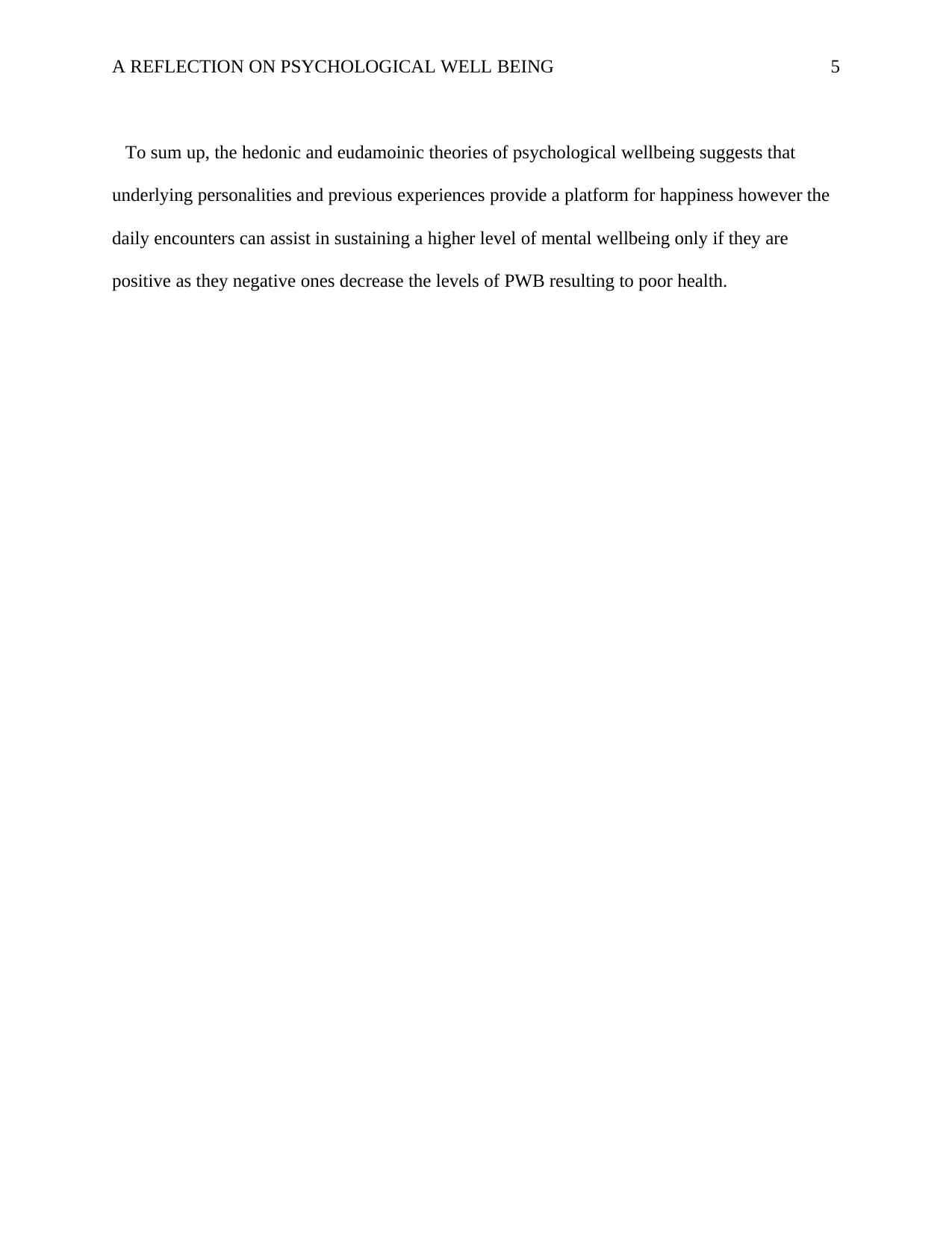
A REFLECTION ON PSYCHOLOGICAL WELL BEING 5
To sum up, the hedonic and eudamoinic theories of psychological wellbeing suggests that
underlying personalities and previous experiences provide a platform for happiness however the
daily encounters can assist in sustaining a higher level of mental wellbeing only if they are
positive as they negative ones decrease the levels of PWB resulting to poor health.
To sum up, the hedonic and eudamoinic theories of psychological wellbeing suggests that
underlying personalities and previous experiences provide a platform for happiness however the
daily encounters can assist in sustaining a higher level of mental wellbeing only if they are
positive as they negative ones decrease the levels of PWB resulting to poor health.
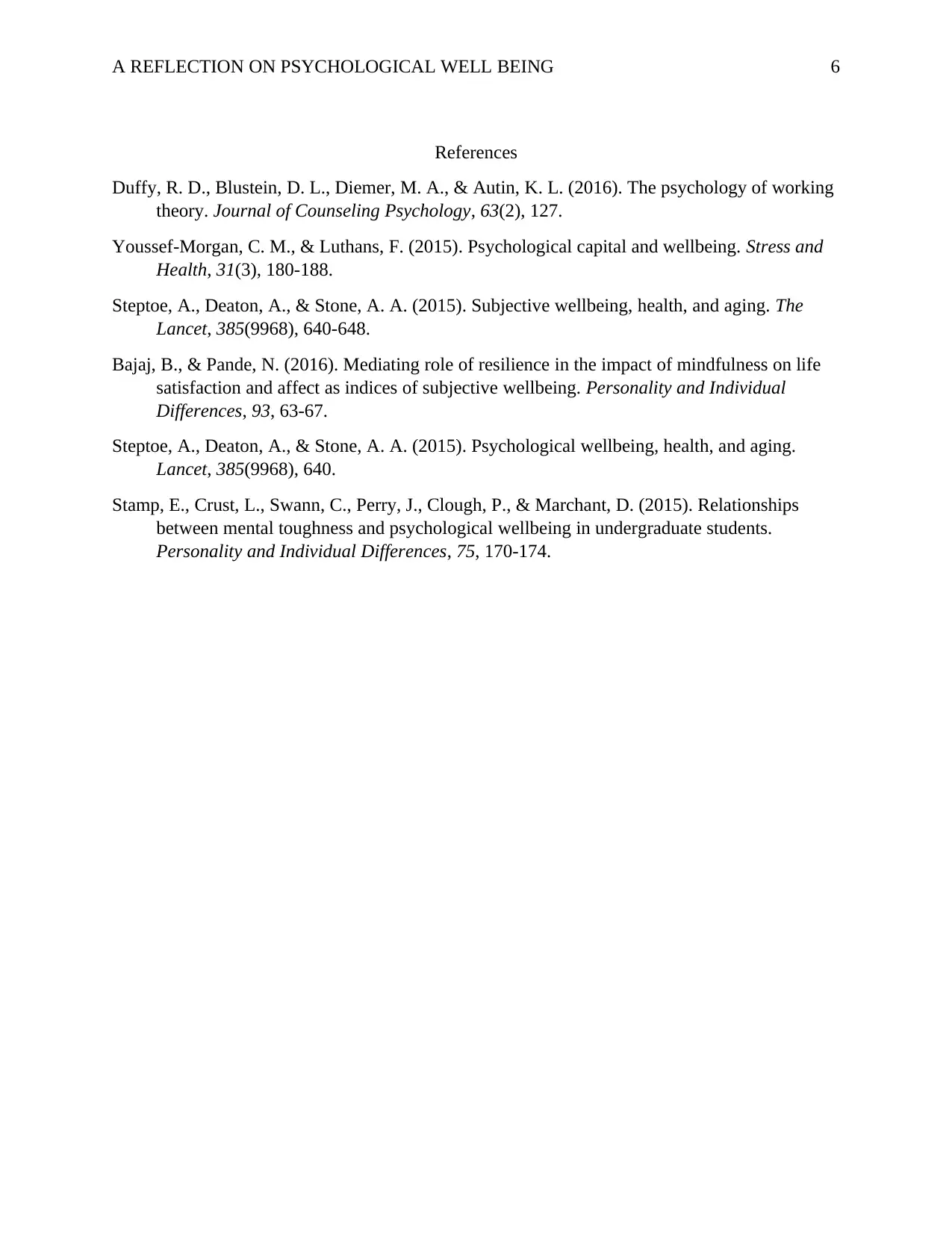
A REFLECTION ON PSYCHOLOGICAL WELL BEING 6
References
Duffy, R. D., Blustein, D. L., Diemer, M. A., & Autin, K. L. (2016). The psychology of working
theory. Journal of Counseling Psychology, 63(2), 127.
Youssef‐Morgan, C. M., & Luthans, F. (2015). Psychological capital and wellbeing. Stress and
Health, 31(3), 180-188.
Steptoe, A., Deaton, A., & Stone, A. A. (2015). Subjective wellbeing, health, and aging. The
Lancet, 385(9968), 640-648.
Bajaj, B., & Pande, N. (2016). Mediating role of resilience in the impact of mindfulness on life
satisfaction and affect as indices of subjective wellbeing. Personality and Individual
Differences, 93, 63-67.
Steptoe, A., Deaton, A., & Stone, A. A. (2015). Psychological wellbeing, health, and aging.
Lancet, 385(9968), 640.
Stamp, E., Crust, L., Swann, C., Perry, J., Clough, P., & Marchant, D. (2015). Relationships
between mental toughness and psychological wellbeing in undergraduate students.
Personality and Individual Differences, 75, 170-174.
References
Duffy, R. D., Blustein, D. L., Diemer, M. A., & Autin, K. L. (2016). The psychology of working
theory. Journal of Counseling Psychology, 63(2), 127.
Youssef‐Morgan, C. M., & Luthans, F. (2015). Psychological capital and wellbeing. Stress and
Health, 31(3), 180-188.
Steptoe, A., Deaton, A., & Stone, A. A. (2015). Subjective wellbeing, health, and aging. The
Lancet, 385(9968), 640-648.
Bajaj, B., & Pande, N. (2016). Mediating role of resilience in the impact of mindfulness on life
satisfaction and affect as indices of subjective wellbeing. Personality and Individual
Differences, 93, 63-67.
Steptoe, A., Deaton, A., & Stone, A. A. (2015). Psychological wellbeing, health, and aging.
Lancet, 385(9968), 640.
Stamp, E., Crust, L., Swann, C., Perry, J., Clough, P., & Marchant, D. (2015). Relationships
between mental toughness and psychological wellbeing in undergraduate students.
Personality and Individual Differences, 75, 170-174.
⊘ This is a preview!⊘
Do you want full access?
Subscribe today to unlock all pages.

Trusted by 1+ million students worldwide
1 out of 6
Related Documents
Your All-in-One AI-Powered Toolkit for Academic Success.
+13062052269
info@desklib.com
Available 24*7 on WhatsApp / Email
![[object Object]](/_next/static/media/star-bottom.7253800d.svg)
Unlock your academic potential
Copyright © 2020–2026 A2Z Services. All Rights Reserved. Developed and managed by ZUCOL.





